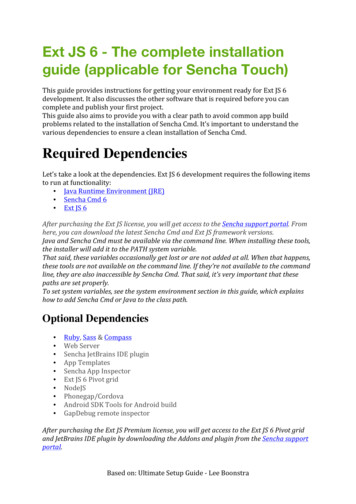
Transcription
Ext JS 7 Modernizing the Ext JS ClassSystemAnd ToolingMarc GusmanoSenior Sales Engineermarc.gusmano@sencha.com
Agenda Ext JS 7 Class system content- Modules- Classes & Mixins- Life-cycle- Goals for language and tools Sencha’s New Tooling The Road Ahead
Ext JS Class System Contents
Namespaces vs Modules
ExtJS: NamespacesExt {};Ext.global window;Ext.global.Ext Ext; Namespaces are nested objects Ext.define() defines class & adds tothe namespace The Loader maps names to URL’sExt.Loader.setPath({Ext: './ext/src', // Ext.grid.PanelApp: './app'// './ext/src/grid/Panel.js'});// App.foo.Bar// './app/foo/Bar.js' Files are loaded at global scopeExt.define('App.some.Thing', {extend: 'App.foo.Bar',requires: [ 'Ext.grid.Panel' ],Ext {global: {Ext: Ext,App: {foo: {Bar: constructor},some: {Thing: constructor}}},grid: {Panel: constructor}}
New: ES2015/ES6Modules./path/file.jsvar foo 'bar';// private, not globalexport var abc 'abc'; Modules are files Modules execute in a private scope (notglobal) Modules publish values using export Modules can have one, unnamed“default” export value Modules use import to acquire valuesexported by other modules Modules are imported by path or nameexport default class Bar {// .}./other/thing.jsimport { abc } from './path/file';import Bar from './path/file.js';import Ext from '@extjs/kernel';import { define } from '@extjs/kernel';
New: Importing Componentsimport { button } from '@extjs/modern';import { hbox } from '@extjs/modern/layout'; Classes are exported in several ways:import { Ext Button } from '@extjs/modern';- By xtype- By alias family- By class name These would be used where stringsmight be used today These exports can be generated bythe new build tool
Sencha Cmd Understands NamespacesNew Build Tools Understands Modules
Classes
ExtJS: ClassesExt.define('App.some.Thing', {extend: 'App.foo.Bar',requires: [ 'Ext.grid.Panel' ],Ext.define() Inheritance Requires (directives) Properties Constructors Methods Static methodsalias: 'thing',text: 'Hello',constructor: function (config) {this.callParent([config]);},method: function (x) {return this.callParent([x]) * 42;},statics: {create: function (cfg) {cfg.type 'thing'; callParentreturn this.callParent([cfg]);}}});
New: ES2015 Classesimport { define } from '@extjs/kernel';import { grid } from '@extjs/modern';import Bar from 'app/foo';import - export - class - @define@define('App.some.Thing', {alias: 'thing', Inheritance Directivestext: 'Hello'})class Thing extends Bar {method (x) {return super.method(x) * 42; Properties} Methodsstatic create (cfg) { Static methodscfg.type 'thing';return super.create(cfg); Super calls (callParent)}}export default Thing;Decorator
New: Decoratorsfunction define (className, body) {return T {T.define(className, body); Decorators are functions thatmanipulate classes (or methods)} Decorators can accept arguments @define('App.some.Thing', {};alias: 'thing',- But must return a function to call as if noarguments were providedtext: 'Hello'}) The @decorator syntax is just adifferent way to call these functionsclass Thing extends Bar { Decorators are currently a Stage 2proposal (not yet standardized)define('App.some.Thing', {}alias: 'thing',text: 'Hello'})(Thing);https://github.com/tc39/proposals
ES2015: Restrictions onconstructorclass Foo {constructor (x) {this.x 42; A constructor can only be called withthe new operator. Calling a constructor with call() orapply() throws a TypeError.}}new Foo(42);let obj {};Foo.call(obj, 42);
Mixins
ExtJS: MixinsExt.define('App.mixin.Foo', {method: function (x) {return x * 42; Mixins is multiple inheritance Mixins are classes Methods from the mixin prototype arecopied to the target class prototype Unless there is already a methodpresent}});Ext.define('App.some.Thing', {extend: 'App.foo.Bar',mixins: [ 'App.mixin.Foo' ],});Ext.define('App.some.OtherThing', {extend: 'App.foo.Bar',mixins: [ 'App.mixin.Foo' ],method: function (x) {return 10 * this.mixins.foo.method.call(this, x);}});
ES2015: Mixins Mixins are classes (that extendExt.Base)import { Ext, define } from '@extjs/kernel';import Bar from 'app/foo';class Mixable extends Ext.Base {method (x) {return x * 42;} Use @define to mix in the mixin(s)} Mixins will be able to act more like atrue base@define({ mixins: [ Mixable ] })class Thing extends Bar {method (x) {return 10 * this.mixins.mixable.method.call(this, x);- The extend directive accepts mixins- Calls to overlapping methods are handledin the super call}}@define({ extend: [ Mixable ] })class OtherThing extends Bar {method (x) {return 10 * super.method(x);}}
Common Object Life-cycle
The Life-cycle of Ext.BaseCreation Instances are created with operator new- or Ext.create() or other factory The native constructor is available to ES2015 classes- Not recommended in most cases The construct method is available to all classes- The new name for the old constructor
The Life-cycle of Ext.BaseConfiguration Use the config directive to define configuration properties Config system calls your apply and update methods Ext.Base construct calls initConfig
The Life-cycle of Ext.BaseDestruction Cleanup is handled by destroy Sets flags like destroying and destroyed Ignores multiple calls Calls destruct (just once) New: Clears instance properties to avoid memory leaks
Sencha’s New Tooling
Sencha Cmd is Java based, and makes use of Apache AntIt’s a task runner, which allows you to: Generation of code and applications Built-in server (Jetty server) File watcher Load assets (Microloader) Compilation of Sass Themes (Fashion) Bundling files Compress, Optimize and Transpile files (Google Closure Compiler) Support for Cordova, Electron, PWA’s etc. Upgrade between versions
Building Modern JavaScript ApplicationsYour codePackagesfrom .jsbundle.jsDev Server
Tools Enable Language AdoptionBuild Tool Trendshttps://www.google.com/trends/explore?cat 5&q grunt,gulp,webpack
New build tool, based on NodeJS“NodeJS is a JavaScript runtime built on Chrome’s V8 JavaScript engine”
Open toolchain
New Build ToolOpen tooling platform
New build tool – We are looking into these technologies: Package managers for fetching alldependencies- NPM & YARN Bundling your modules to use in a browser- Webpack 2 Loading assets- Webpack 2 Built-in server and file watcher- Webpack server “Upgradinator”- Custom Sencha tool to upgrade existing code to ES6decorator syntax. Transpiling ES2015 code to browser ready ES5code- Babel Node modules organization- Mondorepo Compilation of Sass themes- Fashion Generation of code- Custom template solution vs. Yeoman Support for:- Electron, Cordova, Service Workers
The Road Ahead
The Road AheadSencha Cmd 6.5 Available now! Uses Google Closure Compiler Supports much of the ES2015 syntax (http://kangax.github.io/compat-table/es6/) Provides polyfills as well Transpiling is optional New compressor (replaces YUI) can process native ES2015 code
The Road AheadExt JS.Next Framework will have changes in Ext.Base New Build Tool and new Sencha Cmd Upgrade tool to convert from projects from Cmd to Build
Questions?
Modernizing the Ext JS Class System And Tooling Marc Gusmano Senior Sales Engineer marc.gusmano@sencha.com. Agenda Ext JS 7 Class system content-Modules-Classes & Mixins-Life-cycle-Goals for language and tools Sencha's New Tooling The Road Ahead. Ext JS Class System Contents. Namespaces vs Modules.










